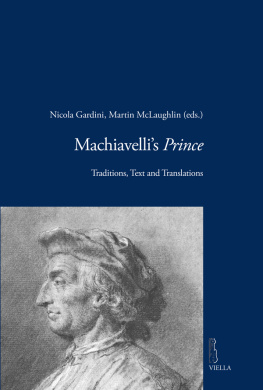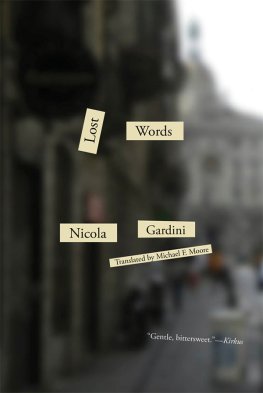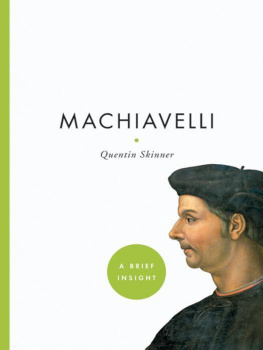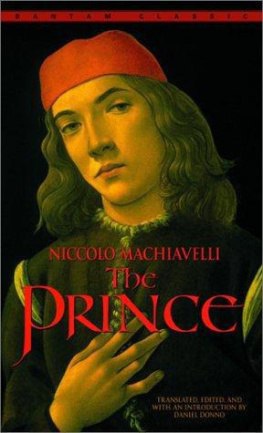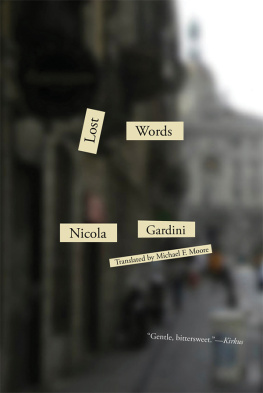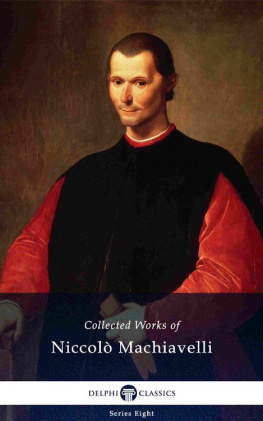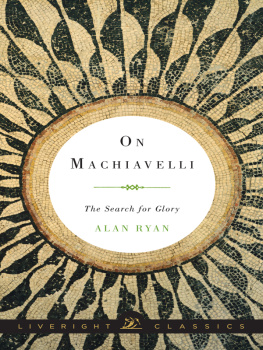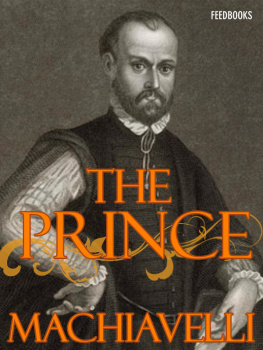One of the high-points of Italian Renaissance humanism, Machiavellis The Prince immediately transcended the time and culture from which it had sprung, circulating throughout Europe and paving the road to an astonishing variety of discussions on power and liberty for centuries to come. Indeed, one could hardly think of a literary work whose reception has been more controversial and arguably more crucial to the fashioning of modernity. This volume gathers together the proceedings of a conference held in Oxford, in November 2013, to mark the 500th anniversary of the composition of The Prince . It explores pivotal aspects of the texts complex identity, focusing on three interrelated areas: 1. The Prince s own ways of appropriating ancient and modern traditions of political thought and ethics; 2. the textual history and interpretive details of the work; 3. translations of the treatise into foreign languages (including English and other translations), with their cultural adaptations and reconceptualizations of the original. All chapters offer highly original insights by leading experts on The Prince , shedding light on hitherto neglected topics and locating Machiavellis masterpiece in an intriguing network of intersecting perspectives.
Contributors : Robert Black, Claudia Bonsi, Mario Domenichelli, Riccardo Fubini, Nicola Gardini, Hilary Gatti, Giorgio Inglese, William Landon, Corinne Manchio, Martin McLaughlin, Martina Obot, Germano Pallini, Alessandra Petrina, Eugenio Refini, Ritchie Robertson, Giorgio Scichilone, Francesca Terrenato
Nicola Gardini is Professor of Italian and Comparative Literature at the University of Oxford, and a Fellow of Keble College. He has published on Italian and Latin literature. Amongst his publications on Italian Renaissance culture are: Le umane parole (Bruno Mondadori, 1997) and Rinascimento (Einaudi, 2010).
Martin McLaughlin is Agnelli-Serena Professor of Italian at the University of Oxford, and a Fellow of Magdalen College. He has published widely on Italian literature from the Middle Ages to the present. Amongst his publications on Italian Renaissance culture are: Literary Imitation in the Italian Renaissance (Oxford University Press, 1995) and Leon Battista Alberti. La vita, lumanesimo, le opere letterarie (Olschki, 2016).
Cover illustration: Giovanni Battista Piazzetta, Medallion Portrait of Niccol Machiavelli. Image Ashmolean Museum, University of Oxford
Viella Historical Research
Machiavellis Prince
Traditions, Text and Translations
edited by
Nicola Gardini and Martin McLaughlin
viella
Copyright 2017 - Viella s.r.l.
Tutti i diritti riservati
Prima edizione: settembre 2017
Prima edizione digitale in formato ePub: dicembre 2017
ISBN 978-88-6728-954-7 ePub

viella
libreria editrice
via delle Alpi, 32
I-00198 ROMA
tel. 06 84 17 758
fax 06 85 35 39 60
www.viella.it
Contents
N icola G ardini, M artin M c L aughlin
Introduction
Traditions
R obert B lack
The Prince and the Political Thinker
R iccardo F ubini
(Re-)Constructing Order: Prudence and Will in The Prince
M ario D omenichelli
Vita, militia: uel Togata, uel Armata: Machiavellis tchne politik
W illiam L andon
Bridging the Supposed Chasm: Tyranny, Republicanism and Lucretius Influence on The Prince and the Discourses
C laudia B onsi
Behind The Prince : Machiavelli as the Transcriber of the Consulte e pratiche of the Florentine Republic
C orinne M anchio
Intertextuality between The Prince and the Legazioni e Commissarie : The Foundations of Experience
H ilary G atti
El nome della libert e gli ordini antiqui sua: The Problem of Liberty in The Prince
Text
G iorgio I nglese
Editing Il principe , 1899-2013
G iorgio S cichilone
The Unnamed Machiavellian Prince: A Hypothesis
E ugenio R efini
Sufficienti e fedeli: Aristotelian and Biblical Patterns in The Prince , Chapter XXII
Translations
G ermano P allini
Breaking the Mirror: Poems of Praise in Early French Translations of The Prince *
A lessandra P etrina
A Treatise of several forms of Government: A Sixteenth-Century English Translation of The Prince *
F rancesca T errenato
The Prince in the Dutch Republic: Dutch and French Translations, 1615-1705*
M artina O bot
Between Political Pragmatism and Literary Canonization: The Prince in Slovene Translations
R itchie R obertson
Machiavelli in Germany, 1678-1810
Bibliography
Acknowledgements
The conference from which this book derives was generously supported by the Faculty of Medieval and Modern Languages, University of Oxford (which also partly funded this volume of proceedings, together with Magdalen College, Oxford); Keble Advanced Studies Centre, Keble College, Oxford; the Modern Humanities Research Association; the Institute for Cultural Inquiry, Berlin.
The editors would like to thank Elisabetta Tarantino for her invaluable help with the editing of this volume.
Note
Throughout the volume, quotations from The Prince are from Giorgio Ingleses 2013 edition. For other works by Machiavelli we have used the Edizione nazionale delle opere di Niccol Machiavelli published by Salerno Editrice, if available, or other editions as identified by the abbreviated titles listed in the Bibliography. The Bibliography also lists the English translations adopted in this volume. Within the chapters, where no other reference is given, a translation is by the chapter author or the editors.
N icola G ardini, M artin M c L aughlin
Introduction
This volume gathers together the proceedings of a conference held in Oxford, in November 2013, to mark the 500 th anniversary of the composition of Machiavellis most famous work. The conference was structured around three major aspects of Machiavellis Prince : namely the traditions of thought on which the treatise was based, the text itself, and the translations of the work. One of the aims was to examine respectively the past, present and future of the treatise, in its fifth centenary. Another rationale behind the conference was the intention to bring together major Machiavelli scholars from both Europe (Italy, France, Slovenia) and the Anglo-American world so that the two traditions of scholarship should enter into fruitful dialogue. The tripartite division is also reflected in the chapters that follow. The first section (chapters 1-7) deals with the mainly classical traditions of political philosophy and thought on which Machiavelli drew, and against which he reacted, for his controversial work. The central section (chapters 8-10) analyses aspects of the text , including the most recent critical edition of The Prince and interpretative details from key chapters. The third and final section (chapters 11-15) considers several important translations of The Prince (French, English, Dutch and Slovenian) before a final chapter which surveys Machiavellis reception in Germany down to 1810.
The opening chapter ( The Prince and the Political Thinker), by Robert Black, illustrates the highly negative environment that conditioned contemporary politics, as Machiavelli saw it, a domain of tyranny, in which both the rulers and the subjects were totally corrupt. Black illustrates the difference between Machiavellis use of the word virtue and that of his predecessors and shows how many of his controversial statements in The Prince are heightened in the Discourses , even though the latter work does also place an emphasis on the common good. As the historian points out, the word Stato (regime) occurs nearly ten times as often as bene comune in the Discourses . The chapter ends with an emphasis on the way the thinkers revolutionary ideas are toned down in the later works, when he has been reconciled with the Medici. Thus by the time he writes the History of Florence in the 1520s he reverses several opinions articulated in The Prince and the Discourses : civic strife is now criticized as counter-productive, the Duke of Athens is condemned for wanting to be feared rather than loved, Francesco Sforza is portrayed as anything but a model new ruler. In his final years, Machiavellis views embodied a political conservatism that was similar to that of his friend, Francesco Guicciardini.
 viella
viella
